新概念英语第一册73课lesson73thewaytokingstreet
新概念英语73课讲义

Lesson 73 the way to King Street一、单词与短语week: n. 周;weekend:周末;London: n.伦敦;in London:在伦敦;Suddenly:adv.突然地;补充:all of a sudden=suddenly:突然地;bus stop:公共汽车站;补充:railway station:火车站;airport:飞机场;smile: v.微笑;wear smile:面带微笑;pleasantly:adv.愉快地;补充:have a pleasant time:玩得高兴;understand:v.懂,明白;补充:make oneself understood: 让别人了解自己;Speak:v.讲,说;speak后边常跟具体的语言,如说汉语:speak Chinese;说英语:speak English;hand: n.手;补充:raise your hand:举手;wave your hand:挥手;pocket:n.衣袋;phrase:n.短语;slowly: adv.缓慢地;二、短语、句型及语法1、She does not know London very well, and she lost her way.他对伦敦不很熟悉,因此迷了路;在本句中有两个知识点需要引起注意:①know、、、well:对、、、了解,例:I know him very well.我非常了解他;I do not know the book very well.我对这本书不是很了解。
②关于与way相关的几个重要短语:lose one′s way: 迷路;I lost my way yesterday:昨天我迷路了;on the way to、、、在去、、、的路上;例:Tom is on the way to school now.汤姆现在正在去学校的路上。
by the way:顺便提一下,顺便问一下,例:By the way, I have something to tell you.我顺便有些事情想告诉你。
新概念第一册词汇语法第73课:ThewaytoKingStreet.docx
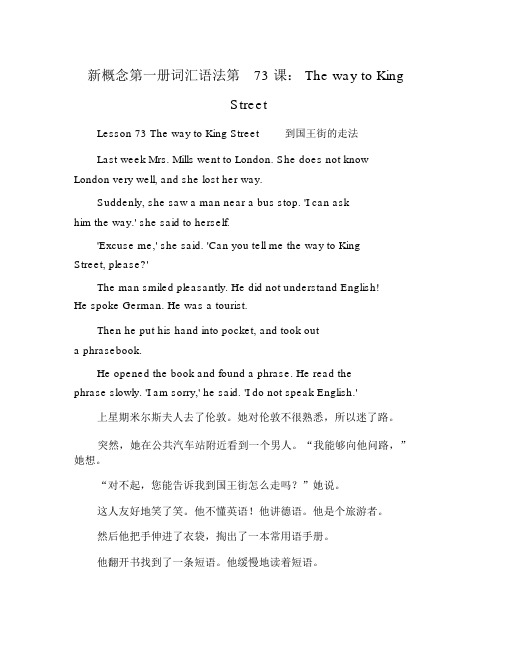
新概念第一册词汇语法第73 课: The way to KingStreetLesson 73 The way to King Street到国王街的走法Last week Mrs. Mills went to London. She does not know London very well, and she lost her way.Suddenly, she saw a man near a bus stop. 'I can askhim the way.' she said to herself.'Excuse me,' she said. 'Can you tell me the way to King Street, please?'The man smiled pleasantly. He did not understand English!He spoke German. He was a tourist.Then he put his hand into pocket, and took outa phrasebook.He opened the book and found a phrase. He read thephrase slowly. 'I am sorry,' he said. 'I do not speak English.'上星期米尔斯夫人去了伦敦。
她对伦敦不很熟悉,所以迷了路。
突然,她在公共汽车站附近看到一个男人。
“我能够向他问路,”她想。
“对不起,您能告诉我到国王街怎么走吗?”她说。
这人友好地笑了笑。
他不懂英语!他讲德语。
他是个旅游者。
然后他把手伸进了衣袋,掏出了一本常用语手册。
他翻开书找到了一条短语。
他缓慢地读着短语。
”很抱歉,“他,”我不会英。
” 1.She does not know London very well. 她敦不很熟悉。
新概念英语第一册第73课
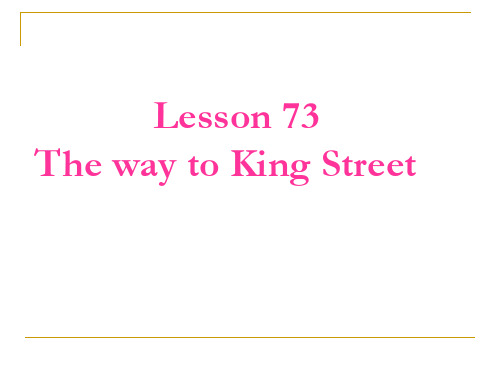
homework
1.听录音并跟读, 2.每个单词5遍,包括不规则动词
课文准备默写 3. 课课练
动词的过去式总结
一般来说,规则动词 v+ ed played, watched 等 以e结尾的动词, 直接+d telephoned, smiled, arrived 等 不规则动词 find-found, see-saw, speak-spoke, put-put
等 需要记忆
phrasebook /freɪz/ 短语手册
pocketˈ /pɒkɪt/ 口袋
speak /spiːk/ 说
watch the video and answer these questions.
Where did Mrs. Mill go last week? Why did the man need a phrasebook? What’s the man’s job(工作)? role playing
listen to the tape again
Last week Mrs. Mills went to London. She does not know London very well, and she lost her way.
Suddenly, she saw a man near a bus stop. 'I can ask him the way.' she sai way to King Street
Do you know the way to King Street?
Last week, Mrs. Mills wanted to go to King street, she didn’t know the way, either. Let’s see what happened?
新概念英语第一册第73-74课:The way to King Street
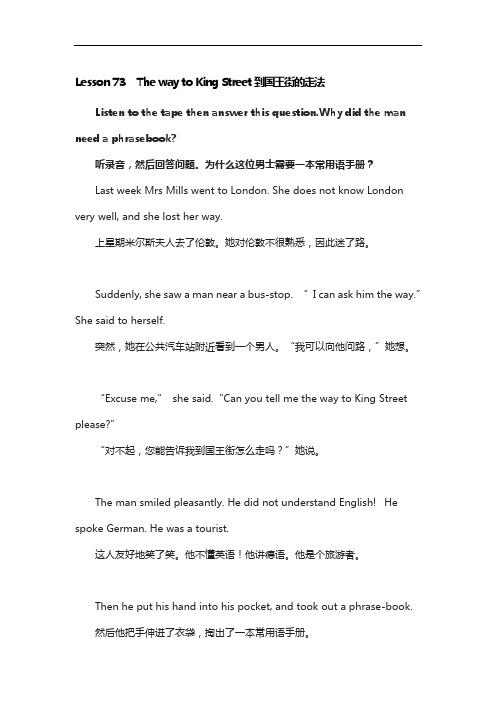
Lesson 73 The way to King Street到国王街的走法Listen to the tape then answer this question.Why did the man need a phrasebook?听录音,然后回答问题。
为什么这位男士需要一本常用语手册?Last week Mrs Mills went to London. She does not know London very well, and she lost her way.上星期米尔斯夫人去了伦敦。
她对伦敦不很熟悉,因此迷了路。
Suddenly, she saw a man near a bus-stop. “I can ask him the way.”She said to herself.突然,她在公共汽车站附近看到一个男人。
“我可以向他问路,”她想。
“Excuse me,”she said.“Can you tell me the way to King Street please?”“对不起,您能告诉我到国王街怎么走吗?”她说。
The man smiled pleasantly. He did not understand English! He spoke German. He was a tourist.这人友好地笑了笑。
他不懂英语!他讲德语。
他是个旅游者。
Then he put his hand into his pocket, and took out a phrase-book.然后他把手伸进了衣袋,掏出了一本常用语手册。
He opened the book and found a phrase. He read the phrase slowly. 他翻开书找到了一条短语。
他缓慢地读着短语。
“I am sorry,”he said. “I do not speak English.””很抱歉,“他说,”我不会讲英语。
新概念英语第一册73课lesson73thewaytoking

The composition of coordinate sentences
Each clause in a coordinate sentence has its own subject and verb, and the clauses are of equal grammatical importance.
The subject of a simple sentence can be a noun or pronoun, and the predicate includes the verb and any complements or
adjuncts.
Simple sentences can be declarative, interrogative, or imperative in form.
Sentence Analysis
• "We set off on our hike with high spirits, excited about the adventure ahead." - This sentence sets the scene for the story and introduces the main characters - a group of friends excited about their upcoming adventure. It also suggests that they are in a positive mood and ready to face any challenges that may come their way.
新概念第一册73课
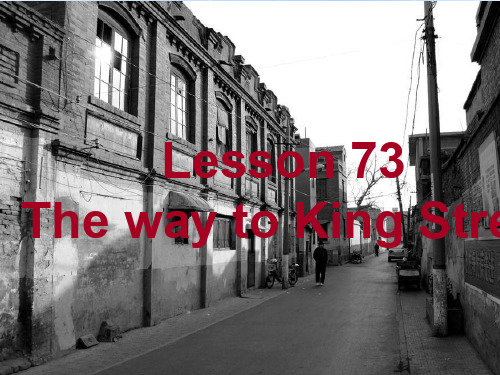
★ smile warm smile on her face.
look, she is smiling at me
★smile at sb.对着某人微笑
• Listen to the tape, then answer this question.
• Why did the man need a phrasebook?
课文讲解
• 1. Last week上周,这个短语奠定了本课是 过去时的基础。 这周 this week,下周 next week
front door.
• ls _w_a_s_(is) in London last week.
• 6.She _w__e_n_t _(go) to Paris last year .
• 7.The mand_r_a_n_k_(drink) their tea very
quickly.
• give sb. a hand 帮助某人 • on the one hand 一方面 • on the other hand 另一方面 • hand in hand 手拉手 • hand in 上交,交付 • hand over to移交给
★lose v. (lost—lost) v.使)迷路迷;(失
Lesson 73 The way to King Stre
规则:将下列给出的单词字母进行重新组合, 得出另外一些单词,看谁说得多!
woman answer father honest
• week
n. 周
• London
n. 伦敦
• suddenly
新概念英语第一册第73-74课听力:The way to King Street
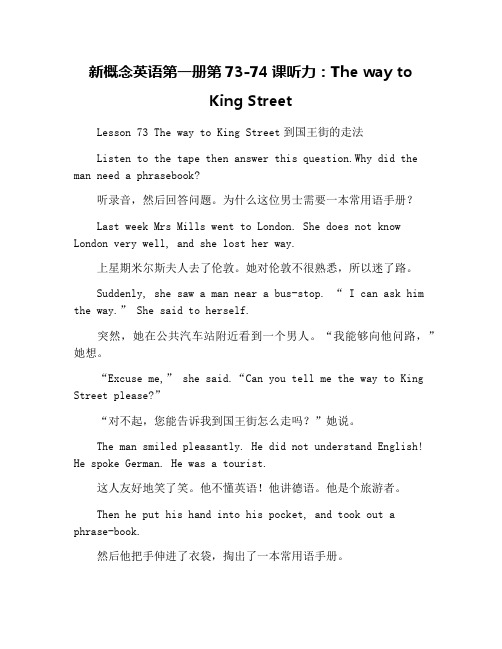
新概念英语第一册第73-74课听力:The way toKing StreetLesson 73 The way to King Street到国王街的走法Listen to the tape then answer this question.Why did the man need a phrasebook?听录音,然后回答问题。
为什么这位男士需要一本常用语手册?Last week Mrs Mills went to London. She does not know London very well, and she lost her way.上星期米尔斯夫人去了伦敦。
她对伦敦不很熟悉,所以迷了路。
Suddenly, she saw a man near a bus-stop. “ I can ask him the way.” She said to herself.突然,她在公共汽车站附近看到一个男人。
“我能够向他问路,”她想。
“Excuse me,” she said.“Can you tell me the way to King Street please?”“对不起,您能告诉我到国王街怎么走吗?”她说。
The man smiled pleasantly. He did not understand English! He spoke German. He was a tourist.这人友好地笑了笑。
他不懂英语!他讲德语。
他是个旅游者。
Then he put his hand into his pocket, and took out a phrase-book.然后他把手伸进了衣袋,掏出了一本常用语手册。
He opened the book and found a phrase. He read the phrase slowly.他翻开书找到了一条短语。
他缓慢地读着短语。
“I am sorry,” he said. “ I do not speak English.””很抱歉,“他说,”我不会讲英语。
新概念英语第一册73-74—The way to King Street
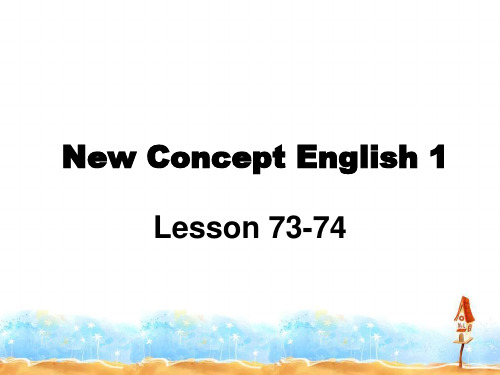
3.某些以辅音字母加不发音的字母e结尾 和以-ue结尾的形容词要先去掉e,然后再
加-ly。
如:
terrible terribly
true
truly
Grammar
• 需注意: friendly; motherly; lovely等词是形 容词而非副词。
• 在英语中,有些词既可以作形容词,又可以作 副词,如early, much, fast, little, wide, loud等。 由于这类词词性虽不同,但词形却一样,这就 需要大家学会在特定语境中判断它们各自 的词性。
quiet-quietly ; pleasant-pleasantly
Grammar
形容词变副词的规则:
2. 以辅音字母加y结尾的形容词要变y为 i,然后再加-ly。
如:
busy
busily
angry angrily
easy
easily
happy happily
Grammar
形容词变副词的规则:
can hear what he said. (adv.)
• 另外,还有一类副词和形容词词义相同,但拼写却 不同,如well和good。
• He speaks good(adj) English. 。 • He speaks English well(adv). 。 • hard---hard late-late good----well
Passage
ask the way 问路 ask sb. sth. 问某人某事。ask sb for sth向某人要某物 say-said say to oneself 心中暗想(不出声地) 反身代词: myself, yourself, himself, herself, itself,ourselves, yourselves, themselves
- 1、下载文档前请自行甄别文档内容的完整性,平台不提供额外的编辑、内容补充、找答案等附加服务。
- 2、"仅部分预览"的文档,不可在线预览部分如存在完整性等问题,可反馈申请退款(可完整预览的文档不适用该条件!)。
- 3、如文档侵犯您的权益,请联系客服反馈,我们会尽快为您处理(人工客服工作时间:9:00-18:30)。
pleasantly adv.愉快地 He smiled pleasantly. 他亲切的微笑。 pleasant adj.愉快的 The climate here is very pleasant.
understand v.懂,明白
understand - understood (过去式) The book is hard to understand. 这本书很难懂。 I don't understand Italian. 我不懂意大利语。
suddenly adv.突然地
He suddenly came in. Suddenly, they screamed.突然,他们尖叫了
bus stop 公共汽车站
在公共汽车站 at the bus stop 我经常在公共汽车站看到他。 I often see him at the bus stop. 火车站 railway he railway station/ airport
say to oneself 心中暗想 talk to oneself 自言自语 find - found read - read
语法-副词
副词 adverb -这个词的本意是补充动词的意 义。许多副词都是这个作用。它可以通过修 饰动词来告诉我们句子中的某个动作的情况 (He runs fast.),也可以告诉我们某事是如 何/何时/何地等发生或进行的。 Suddenly, it rained. He lives in Dongsheng. I went to Kangbashi yesterday.
我们发现可以是一个词,也可是一个词组。 The old man is walking slowly. You did it very well. 形容词转换为副词一般遵循3个规则: quick - quickly , pleasant -pleasantly 1. 在形容词后直接加 -ly. happy -happily 2. 以 -y 结尾的, 把y 变为i 再加 -ly. late -late, fast -fast, hard -hard, well -well 3.形容词与副词形式相同。
slow adj. 缓慢的
know ...well 对。。了解 我不太了解他。 I don't know him very wel. and she lost her way. and - 所以 lost one's way 迷路 ask sb. the way 问路 如果你迷路了,你可以找人问路。 If you lost, you can ask someone the way.
smile v.微笑
smile - smell 发音区别 smile at sb. 对某人微笑 我对着孩子们微笑然后打了招呼。 I smiled at the children and said hello. n. 微笑 give sb. a smile 给某人一个微笑 laugh 大声笑 laugh at 嘲笑某人 Don't laugh at others.别嘲笑别人。
speak - spoke speak to sb. 我能讲三种语言。 I can speak three kinds of languages.
n.手
second hand 二手 我买了一辆二手车。 I bought a second hand car. give sb. a hand 帮助 你能帮助我吗? Can you give me a hand ?
. 衣袋
我找不到衣袋里的钥匙了。 I can't find the key in my pocket. pocket money 零花钱
slowly adv.缓慢地
Can you drive a little slowly ? 你能慢点开车吗? They are walking slowly along the street.
Lesson 73 The way to King Street
week n.周 There are seve days in a week, Monday, Tuesday, Wednesday, Thursday, Friday, Saturday and Sunday. weekday 工作日;上学日(星期一到星期五) on weekdays 在平日,在工作日 weekend 周末 at weekends 在周末 weekly adj. 每周的
